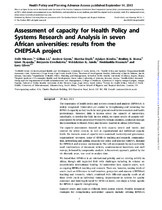Assessment of capacity for health policy and systems research and analysis in seven African universities: results from the CHEPSAA project
Date
2014Author
Tolib, Mirzoev
Gillian, Le
Andrew, Green
Marsha, Orgill
Adalgot, Komba
Reuben K., Esena
Linet, Nyapada
Benjamin, Uzochukwu
Woldekidan K., Amde
Nonhlanhla, Nxumalo
Lucy, Gilson
Metadata
Show full item recordAbstract
The importance of health policy and systems research and analysis (HPSR+A) is widely recognized. Universities are central to strengthening and sustaining the
HPSR+A capacity as they teach the next generation of decision-makers and health professionals. However, little is known about the capacity of universities, specifically, to develop the field. In this article, we report results of capacity self- assessments by seven universities within five African countries, conducted through the Consortium for Health Policy and Systems Analysis in Africa (CHEPSAA). The capacity assessments focused on both capacity ‘assets’ and ‘needs’, and covered the wider context, as well as organizational and individual capacity levels. Six thematic areas of capacity were examined: leadership and governance, organizations’ resources, scope of HPSR+A teaching and research, communication, networking and getting research into policy and practice (GRIPP), demand for HPRS+A and resource environment. The self-assessments by each university used combinations of document reviews, semi-structured interviews and staff surveys, followed by comparative analysis. A framework approach, guided by the six thematic areas, was used to analyse data. We found that HPSR+A is an international priority, and an existing activity in Africa, though still neglected field with challenges including its reliance on unpredictable international funding. All universities have capacity assets, such as ongoing HPSR+A teaching and research. There are, however, varying levels of assets (such as differences in staff numbers, group sizes and amount of HPSR+A teaching and research), which, combined with different capacity needs at all three levels (such as individual training, improvement in systems for quality assurance and fostering demand for HPSR+A work), can shape a future agenda for HPSR+A capacity strengthening. Capacity assets and needs at different levels appear related. Possible integrated strategies for strengthening universities’ capacity include: refining HPSR+A vision, mainstreaming the subject into under- and post-graduate teaching, developing emerging leaders and aligning HPSR+A capacity strengthening within the wider organizational development.

